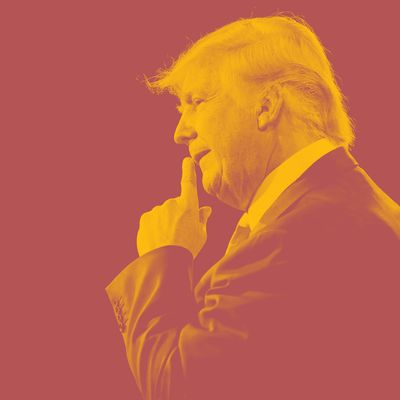
Ever since Donald J. Trump was elected president, David Dunning’s phone has been ringing off the hook. Dunning, a social psychologist, is one of the lead authors of “Unskilled and Unaware of It: How Difficulties in Recognizing One’s Incompetence Lead to Inflated Self-Assessments,” an article in the Journal of Personality and Social Psychology based on the results of a study he and a student, Justin Kruger, conducted at Cornell in 1999. As the title suggests, what they found was the existence of a cognitive bias in which the less able people are, the more likely they are to overestimate their abilities. Or as Dunning put it recently over the phone from the University of Michigan, where he now teaches: “People don’t know what they don’t know.”
The Dunning-Kruger effect, as it came to be known, was an immediate hit with armchair psychologists: Everyone knows someone they could diagnose as too dumb to even know it. Eighteen years later, the concept has achieved a kind of steady virality online, not only because the internet’s atmosphere — “an incredible Wild West of misinformation,” as Dunning puts it — has made it possible for anyone to posture as an expert, but because it is the preferred platform for people to call one another idiots. As a quick search of Twitter reveals, Dunning-Kruger is invoked nearly every day by people arguing against each other’s intelligence. (Sample dialogue from October: “Said like a true deluded simpleton Dunning-Kruger!” “You are the one suffering Dunning-Kruger!”) A usage that Dunning finds “unfortunate, and ironic,” as it indicates a misunderstanding of the effect. “We weren’t talking about ‘them out there’ being incompetent. We were talking about how each of us is incompetent,” he said. “Dunning-Kruger should cause people to reflect on themselves, not to throw epithets at others.”
In hindsight, this kind self-reflection may have been useful in the lead up to the 2016 presidential election, when mentions of Dunning-Kruger on social media reached a new high. In the beginning, many of them were in reference to the candidate Donald Trump, whose combination of over the top blustering (“My IQ is one of the highest,” he has claimed) and obvious ignorance in areas such as foreign policy struck many Twitters users as, “the personification of the Dunning-Kruger effect.”
Dunning himself didn’t disagree. “During the campaign, Trump made a number of statements that didn’t seem well-considered,” he says, citing Trump’s unconstitutional Muslim ban, his apparent unfamiliarity with the nuclear triad, and the time he suggested United States creditors “take a haircut” on Treasury bonds without seeming to understand the role of said bonds in the world economy. “It seemed, especially in contrast with Hillary Clinton, that this was one of the least prepared candidates in my lifetime, but also the most confident candidate. It seemed like the most public example of the Dunning-Kruger effect, or something that looked like the Dunning-Kruger effect, that I’d ever seen.”
Dunning was confident enough in this assessment that back in May he weighed in with a piece for Politico, suggesting that not only was Trump a manifestation of the effect but that support for him was grounded in similar ignorance. “They might like some of what they hear from Trump,” he wrote, of Trump voters. “But they do not know enough to hold him accountable for the serious gaffes he makes. They fail to recognize those gaffes as missteps.”
Of course, as the results of the election revealed, Trump supporters weren’t the only ones “suffering from Dunning-Kruger,” as goes the social-media j’accuse. As it turns out, we were all the deluded simpletons.
Dunning was as surprised as everyone at the turn of the election. “No one really predicted what happened,” he said, pointing out that in most elections, both sides believe they will win, but in this case it was clear that not even Trump thought he stood a chance. “We basically had a collective Dunning-Kruger event.”
He stands by his opinion of Trump. (“The Dunning-Kruger President,” as more than one person glumly tweeted in the aftermath of the president-elect saying that he didn’t need to receive intelligence briefings, “Because I’m like, a smart person.”) “He clearly doesn’t know things like you have to replace the staff of the West Wing, and is unsure what current policies the U.S. government has,” observed Dunning. Although, to be fair: “I can’t imagine anybody walking into the Oval Office and it not being the Dunning-Kruger effect. The job has so many complex dimensions, there’s economic and social and foreign policies, I don’t know how anybody thinks they could program their range to do all of it. But that’s why you hire good people, I guess.”
There was a sad pause in our conversation.
But although the Trump victory may be bad for humanity, it also provides a “terrific object lesson,” according to Dunning, of what he was talking about earlier, that everyone, no matter how smart they are (or claim to be on the internet) can still be wrong. “Life throws surprises,” he says. “I hope that’s not missed in all of the analysis. This a problem with human judgment: We have surprises, and we analyze them, and get really good at explaining them, and then we get overconfident in our ability to predict the future.”
At the moment, as he works on a new book, tentatively titled Foolosophy, Dunning is staying away from making any predictions. Except one: “It’s clear he’s going to affront a lot of conventional wisdom,” he says. But then again: “Maybe conventional wisdom is Dunning-Kruger.”




